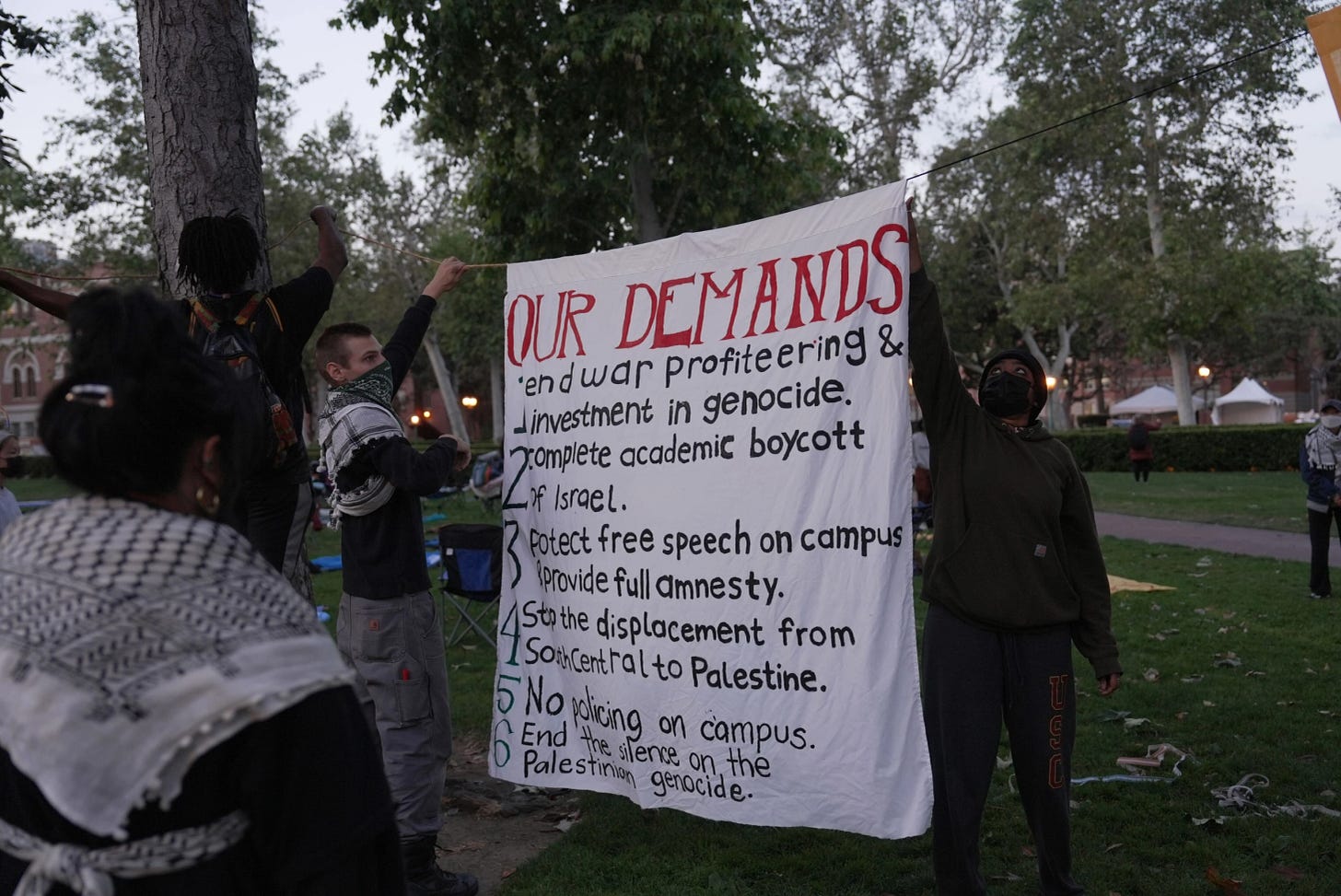Vitriolic, unruly, and violent antisemitic protests have come to the USC campus.

After a day of mayhem, LAPD has arrested some miscreants and restored order. According to the NYT coverage:
The Los Angeles Police Department said that it had arrested 93 people on the University of Southern California campus. Earlier, Capt. Kelly Muniz told reporters that all the arrests were all on trespassing charges at the request of the university, which did not want other charges.
I am surprised only 93 people were arrested. Judging from the videos, the crowds were much bigger. As in previous protests, there is significant involvement of non-USC agitators and mobsters. Here is post from one such outside group:
From the provost’s message (April 24, 2024):
During a protest on campus today, which is taking place outside Doheny Library and in the center of academic buildings, participants—many of whom do not appear to be affiliated with USC—were repeatedly asked by security personnel to remove their tents and other prohibited items as well as relocate to a compliant location. In each case, protesters refused. Their actions have escalated to the point of confrontation and have threatened the safety of our officers and campus community.
The message specifically says: “We want to be clear that we reject speech that is hateful and that causes harm to others.”
Another update was sent by the USC office of Vice President at 9:28 pm, April 24:
We are writing to let you know that our University Park Campus is in the process of being returned to normal operations. University gates will remain closed to anyone without proper USC identification or verifiable business purpose, at least through the weekend, similar to our weeknight and weekend entry protocols.
We expect all campus functions will be fully operational again tomorrow; academic and campus activities will operate on their regular schedules, though some classes may move online at the discretion of faculty and individual schools.
The USC TrojanAlert system sent an email at 11:07 pm, April 24: “The protest on the UPC has ended. However, the campus remains closed until further notice. Students, faculty, staff, and people with business on campus may enter with proper identification.”
Message from USC Hillel (reproduced from the email):
USC Hillel stands with Jewish students. While students have a right to protest, they do not have the right to intimidate or threaten Jewish students. Today's events on campus included a protest action that again employed antisemitic chants including “there is only one solution, intifada revolution” and “long live the intifada.”
These actions reflect a disturbing and quickly escalating situation nationally and on our own campus at USC. No student should feel unwelcome in their own campus home, and our Jewish students are telling us that these actions and this hostile rhetoric induce feelings of fear, terror, and instability. They cannot feel as though they must hide their identity in order to experience inclusion in our campus environment, nor should they feel that their fundamental safety is at risk.
We call upon our campus partners and seek their support in ensuring a safe campus and in addressing these acute instances of intimidation.
To our students: You are never alone. Our doors are always open. Hillel is your home for Jewish life on campus and we are on call and present for and with you.
—Dave Cohn, Allen & Ruth Ziegler Executive Director
Violent and disruptive protests are not protected by the First Amendment, as clearly explained in this message from FIRE:
FIRE statement on campus violence and arrests:
Violence is never acceptable.
Colleges and universities must ensure the swift arrest of anyone engaging in violence on campus, whether committed by students or visitors. Violence thus far appears to have been isolated, but things can change at any moment, and it must be made clear that any violence is unacceptable. Institutions must provide meaningful security and take prompt action to separate groups when tensions flare. For everyone’s safety, and to secure expressive rights for all, no one on campus should have any sense whatsoever that violence will be tolerated or excused.
In an article, Protest and Civil Disobedience Are Two Different Things, published in The Chronicle, constitutional scholar Professor Keith Whittington further explains the boundaries between protected expression and campus disruption, and clarifies the responsibilities of the universities:
Every college needs a set of policies balancing the need to provide ample opportunity for free expression on campus with the need to preserve the efficient and effective functioning of the university. In the language of First Amendment jurisprudence, that means the establishment of time, place, and manner regulations. The critical feature of such regulations is that they be content- and viewpoint-neutral. They do not distinguish between expressive activities on the basis of the messages being purveyed. Rather, they circumscribe how expressive activities can be conducted so that they do not unnecessarily interfere with the activities of other members of the campus community.
He further explains:
It is a frequent category error to imagine that such protests should be tolerated so long as they are nonviolent. The purpose of time, place, and manner regulations is not to stave off violence but to coordinate socially beneficial activities. Protests need to be stopped not only when they become violent but also when they interfere with the ability of others to use the campus for their own purposes.
and
In order to prevent such demonstrations from getting out of hand, college must take aggressive measures to respond to actual physical violence, threats, and intimidation. The tactics of organized political street violence that have been deployed in American cities over the past few years are beginning to appear on college campuses, whether used by students or outsiders. Protesters who form human barricades to obstruct campus pathways, shelter violent agitators, or hinder law enforcement require prompt and firm intervention on the part of campus officials.




